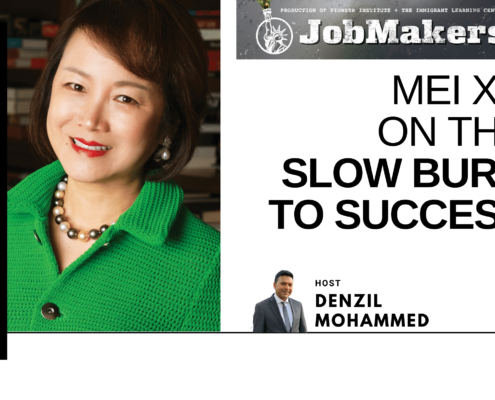Patrick Anquetil on America’s Freedom to Innovate
/in Economic Opportunity, Featured, JobMakers /by Editorial Staff
This week on JobMakers, host Denzil Mohammed talks with Dr. Patrick Anquetil, immigrant from France and co-founder and CEO of Portal Instruments in Cambridge, Massachusetts, a clinical stage medical device company developing a needle-free drug delivery platform. As Patrick shares, there was no way he could have started a business like this in his home country. The spirit of entrepreneurship that we take as a given here in America does not exist everywhere; in many countries, taking risks to start a business is actually frowned upon. So, Patrick went to MIT, which he says gave him “a sense of great possibilities.” That freedom to innovate has led, in his case, to a transformative patient experience, something we can all appreciate. But it could only have been created in a place that fosters an entrepreneurial spirit in its people, new or old, as you’ll learn in this week’s JobMakers podcast.
Guest:
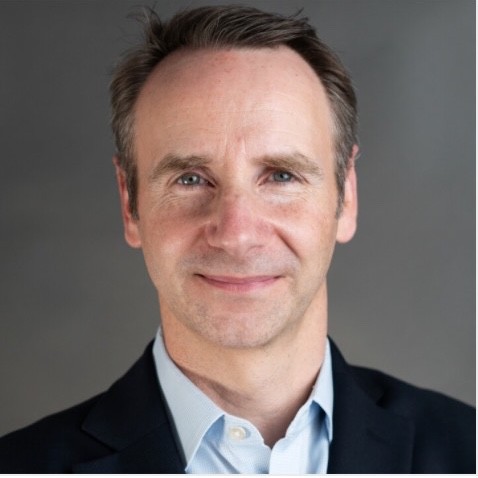 Patrick Anquetil, PhD, MBA is Portal Instruments’ Chief Executive Officer. Patrick brings more than 18 years of experience leading high-tech bioengineering companies from the lab to the market place and building world-class teams. Prior to founding Portal Instruments, from 2009 to 2012, he was co-founder and director of strategic planning for SynapDx Corporation, where he had responsibility for development of the company’s business and operational plans as well as securing Series A funding. SynapDx went on to raise more than $40 million in venture capital to develop the first test to detect the early onset of autism using technologies licensed exclusively from Boston Children’s Hospital and George Washington University. He also co-founded Aretais, Inc. to develop a non-invasive method to detect blood glucose using Coherent Anti-Stokes Raman Spectroscopy (CARS) backed by Pfizer, Inc. Patrick began his career as a science and nanotechnology equity research analyst at Susquehanna International Group, authoring and marketing industry and equity research reports to hedge funds and portfolio managers. Patrick holds a doctorate in BioInstrumentation from MIT, an MBA from Harvard University, and a master’s degree from the ETH in Zurich and the University of Tokyo. His scientific work has appeared in numerous peer-reviewed publications as well as mainstream media, including MIT Technology Review, Wired Magazine, PBS, and CNBC among others.
Patrick Anquetil, PhD, MBA is Portal Instruments’ Chief Executive Officer. Patrick brings more than 18 years of experience leading high-tech bioengineering companies from the lab to the market place and building world-class teams. Prior to founding Portal Instruments, from 2009 to 2012, he was co-founder and director of strategic planning for SynapDx Corporation, where he had responsibility for development of the company’s business and operational plans as well as securing Series A funding. SynapDx went on to raise more than $40 million in venture capital to develop the first test to detect the early onset of autism using technologies licensed exclusively from Boston Children’s Hospital and George Washington University. He also co-founded Aretais, Inc. to develop a non-invasive method to detect blood glucose using Coherent Anti-Stokes Raman Spectroscopy (CARS) backed by Pfizer, Inc. Patrick began his career as a science and nanotechnology equity research analyst at Susquehanna International Group, authoring and marketing industry and equity research reports to hedge funds and portfolio managers. Patrick holds a doctorate in BioInstrumentation from MIT, an MBA from Harvard University, and a master’s degree from the ETH in Zurich and the University of Tokyo. His scientific work has appeared in numerous peer-reviewed publications as well as mainstream media, including MIT Technology Review, Wired Magazine, PBS, and CNBC among others.
Get new episodes of JobMakers in your inbox!
Read a Transcript of This Episode
Please excuse typos.
Denzil Mohammed:
I’m Denzil Mohamed and welcome back to Jobmakers.
Denzil Mohammed:
Perhaps the most special characteristic of the United States is its entrepreneurial spirit. Many immigrants grab onto that to innovate, start businesses and create jobs. It is in fact, a story as old as time, from Levi’s jeans and Kraft cheese to SpaceX rockets and Gmail accounts. We take this as a given here in the US, but this is not something that exists everywhere. In many countries, there isn’t the infrastructure to support entrepreneurship and taking the risks to start a business is actually frowned upon. For Dr. Patrick Anquetil, immigrant from France and co-founder and CEO of Portal Instruments in Cambridge, Massachusetts, a clinical stage medical device company, developing a needle-free drug delivery platform, there was no way he could have started a business like this in his home country. At that time, entrepreneurship was not viewed as a path to success. So he traveled to MIT, which he says gave him quote, “a sense of great possibilities as if he broke free.” That freedom to innovate will lead in Patrick’s case to a transformative patient experience in a needle-free world. Something we should all be grateful for, but it could only have been conceived and created in a place that fosters an entrepreneurial spirit in its people, old or new. As you’ll learn in this week’s Jobmaker’s podcast
Denzil Mohammed:
Anquetil co-founder and CEO of Portal Instruments based in Cambridge, Massachusetts, welcome to the Jobmakers podcast.
Patrick Anquetil:
Thanks for having me. It’s a pleasure to be here andwe love job creation. SoI’m thank you for the opportunity.
Denzil Mohammed:
We love it too. So who is Patrick Anquetil and what is Portal Instruments?
Patrick Anquetil:
Sure. So as you probably can tell from my accent, I’m from France originallyI came to the US about 20 plus years ago. I loved it and basically stayedbecame an American citizenas a result andbeen delighted to be so My background is, I have a degreeactually in engineering, mechanical engineering to be more precisealso went to Harvard business school where I got my MBAand really what I like to do is actually create companiesand really make a contribution there to create products or services that have a high need and hopefullyhelp make the world better. Portal Instruments is the latest company I co-foundedit’s a device out of MIT that can inject medicines without needles. So really solving a huge problem that’s clinically relevant, butunfortunately overlooked actually by our industry. And sothat creates the environment for us to be there and change that.
Denzil Mohammed:
Yeah. You’re gonna have to explain how the medicine becomes the needle.
Patrick Anquetil:
Correct.
Denzil Mohammed:
I’ve known you for a long time and I’ve read a lot about you and you’ve often associated being an immigrant with being an entrepreneur. Let’s talk about that. The first part of that being an immigrantyou said you were here from France. What was life like growing up in your arrondisement in Paris?
Patrick Anquetil:
You know, it was great. I mean, I I’m, so I think I was extremely fortunate. You know, I had a, a very blessed childhood. I lived in a very nice area in Paris you know not too far away from the Eiffel tower. And yeah, I think, I think at the same time though the idea to create a company was as remote as I could imagine. I always thought that this was something for someone else that this is stuff that you read basically in the newspapers, you know, in, in profiles, but certainly, you know, with a French context at the time, there was no way, you know, I could be that guy or that guy who had started a company. And then I came to the US and that really changed. And I realized actually anyone can do it.
Patrick Anquetil:
And in fact, that’s really the center piece of it in that you realize, well, gee, you know, if she can do it, so can I, right. And I think, I think the, the, the role of role models is so important. And I think really at the time in France, there were no role models actually at all. In fact, if, if you had started a company and done really, really well it was almost frowned upon that there was something malicious you know, about you that you had maybe had a shady pass. So to say of course this is now we’re talking 30, 40 plus years ago if probably 40 plus years ago. And it’s changed quite radically now, but, but I think at the time it, it, it was true that there was no true role models as we have today that could associate with. And I always start starting a company would be something for someone else.
Denzil Mohammed:
Isn’t that crazy?
Patrick Anquetil:
It is crazy. Yes.
Denzil Mohammed:
How could you not encourage entrepreneurship and, and innovation and job creation? So you thrive over an immigrant because you first moved to study in Switzerland, and then you spent time in Japan. And then of course, as you said, 20 something years ago, you moved to the us, what were those experiences like very disparate sort of places, right?
Patrick Anquetil:
Yeah. You know, I think what’s interesting. They all had the same thing in common that you had to be on your own and be responsible. Right? You, you what actually loved about the experience in Zurich? I, I was tremendously fortunate that I knew German because my mother is German. So I had no issue studying in German. And I’m still amazed to this day that my parents supported actually that idea. And I mean, it wasn’t trivial. I mean, you, I mean, at the time, again, this was pre-internet <laugh>, you know and so moving to another country was, was actually quite an adventure. And and I think as a result, because my parents gave me so much trust there was just no way I was going to come back. And so it had to be successful. I had to find a way to be successful.
Patrick Anquetil:
And I think that is the immigrant story. And it’s the same thing in Japan. I mean, I remember believe it or not arriving, you know, after like you know, I think it’s a 13 hour flight, you know, from Zurich arriving in Tokyo and finally making it to my dome room and it was dark and actually literally crying the first day, what am I doing? And then you wake up the next day and it’s like, okay, no, time’s up, you know, back to work, you know, and, and you gotta figure it out and and make it happen. And so I think that’s immigrant story. I think, I think that’s what makes it unique. And so if you compare it with entrepreneurship, it is a form of entrepreneurship as well. It happens to be the entrepreneurship of you. And then I think those lessons are, you know, conversely can be also applied when you start your own company, right. It’s the same thing you figure is not an option. And you’re gonna try to make it work because there is no turning back. Right. and so I, I think that’s those, it is no question that those experiences really transformed me and probably made me want to be an entrepreneur as a result.
Denzil Mohammed:
Wow. And fluent in, in, in German, fluent in English, fluent in French, you learned a little bit of Japanese too. I read that you taught yourself English by reading dungeon and dragons books.
Patrick Anquetil:
Oh my God, that’s true. I’m, I’m amazed. You know, that that’s, that’s, that’s, that’s really true.
Denzil Mohammed:
That is very unique. Most people, you know, will say MTV or Michael Jackson, things like that. But I did read that you saw, you always wanted to be an entrepreneur, but as you mentioned, the ecosystem in France at the time, didn’t allow for that or dissuade to that. And when you started your doctorate at MIT, you said people were starting businesses left and right. And you felt a great sense of a sense of great possibilities. You felt like you broke free. Explain that.
Patrick Anquetil:
Well, there were many things actually going on. I think, I think what made the us, the, the thing I remember vividly from those days is how in the us, it’s almost the ultimate I immigrate immigrant story because no, one’s got your back, you know, plus it’s a, you know, I, I had no family here on top of that. So it’s interesting. And it’s you know, and, and maybe some people, people can be different, but I think for me having no safety net kind of was liberating in a way, because it meant that there was only one path it’s interesting. The safety net is great, but it’s also a distraction as well, because now you’re focusing on the safety net instead of focusing on what you’re building. And so with that in mind, it was that context in mind. I also felt that at the time at MIT, this was doing the, the.com boom, everyone was starting companies left and right.
Patrick Anquetil:
And and so there were role models that were there that you could actually talk to and, and observe. And in fact, it was almost the opposite that if you weren’t starting something, then there must be something wrong about you. Right. It kind of was more the, the odd thing that you didn’t do anything versus versus the opposite. So, so I think, I think that environment were actually quite, quite unique as well. On campus. There were a lot of, there was a lot of support for those types of endeavors. There was, of course the, the business plan competition, which was the MIT 50 K at that time. No, it’s the 10, the a hundred K I guess maybe even more, you know, inflation is, is real AF even in that, in that sector, I guess. And there were also courses that you could take or classes you could take. There were, you know, after after hours activities actually as well. So, so there was a whole ecosystem there too, to support it. In
Denzil Mohammed:
A recent episode, I interviewed a guy called AKI Balog from Hungary who founded a, a tech marketing company called market news. And he said, 50% of our startup is emotional control. Yes. Given your experience, do
Patrick Anquetil:
You agree? I think it’s a hundred percent not 50 <laugh>. Yeah, I think, I think it’s, it’s you know, I, first of all, one thinks that it’s like the hockey stick, the J curve. So, you know, like you basically, you’re going to the, the negative and then woo. You sort of, you know, shut out as an exponential out. That’s really the myth. The reality is more, it’s a constant up and down and it’s like, you know, for one up you get three down. And, and I think it’s, it’s, it really becomes a, an exercise in managing your own psyche and then as CEO or someone from the, the, the senior team really, it’s important to show how those ups and down don’t phase you, that, you know, you don’t panic. Cause of course, everyone’s looking at you if, if you’re the leader of the company. So I think, I think interestingly a lot of it is not being too emotional about the challenges and, and being, you know, I guess, soft food, you know, lack a better word, you know, it’s, it’s more deposed and realize that, look, this is just another problem we’re gonna solve it. You know, this is what we do.
Denzil Mohammed:
So let’s bring it into today. Portal Instruments. I saw some pretty alarming statistics about needles that across the world, there are about 10 million people who contract some form of disease because of an incident involving a needle that the CDC puts needle fair at 25% of among us adults. I’m about 20 of that 25%. And that needle phobia accounts for about 10% of COVID vaccine hesitancy in the UK, my, my mind, there’s a problem. Yeah,
Patrick Anquetil:
It’s crazy. And, and by the way, we’ve done our own surveys. It’s even worse in our sample than you, what you just described. I mean, it’s, it’s pretty amazing. We run a survey. This was back in in September 400 us respondent. We had a 30% not vaccinated rate, which is no pretty good. I think in a population was a bit worse than that. Maybe four around 40% at the time, but still, you know, kind of directionally the same. We asked that 30%. Well, gee, you know, if you had any free option would you have done it? And we had 45% who said, yes. I mean, it’s crazy. I mean, I even, I was very, you know, enthusiastic and, you know, believer in what we do really. I would’ve guessed, you know, five to 10% max, you know, so, so very high.
Patrick Anquetil:
And then we asked the 70% that was vaccinated. If they would’ve spent $10 for needle free option and there, we had 70% who said, yes, the pharmaceutical industry is really measured, you know, from, from an FDA regulatory perspective fully only on two measures, which is safety and efficacy, right. And those two metrics don’t really involve what the patients feel in terms of the experience. Right. And I think we look at this as there’s a screaming opportunity. If you can introduce an orthogonal metric around patient preference patient tolerance ease of use, it’s typically you’d be ridiculed to look at patient convenience as something driving, basically a healthcare product, it’s safety and efficacy. And that’s it to me, this, this highlights how we’ve got again, a, a clinically relevant problem that’s completely overlooked as well. And I think it’s important to change that in particular with newer medicines being predominantly administered by an Eland syringes there is a huge burden that’s there for the patient.
Patrick Anquetil:
There’s also a huge burden on society around how you dispose of those needles. You know, these are contaminated. A friend of mine runs pucks in recreation at in, in Boston. And once in a while you would know from Boston, they clean the the muddy river. And you would think that they’re getting be one or two syringes, one you know, like throughout that course it’s bags of syringes. Oh, no, it’s interesting bags of it’s crazy. And, and it’s striking that no one talks about that, you know, and I think the fact that we’ve got devices that kill people most of them of course happen in, in the developing world, unfortunately. But it’s not uncommon for in particular, the medical staff to get exposed to pathogens via a an accidental needle break. It happens so many, so many times and I think in this day and age, that should not, not happen actually at all.
Patrick Anquetil:
You’ve been to our offices, you know, on our wall. It says a needle free world, and that’s truly what the aspiration is of the, the company. We will focus first on, you know, chronic diseases high value therapies that really drive, you know, tremendous benefits to patients. We want to help them, those patients further for, for them suffering from chronic diseases, make the burden of the injection less less of a burden and, and something just, you know, just more easy to use do the injection and then go on with your life. Don’t have to worry about, you know, getting someone accidentally, you know, pricked with the, the syringe and, and so on.
Denzil Mohammed:
So when do you, when do you see this happening? Where do you see yourself in five or 10 years?
Patrick Anquetil:
I think, I think in five to 10 years we will have a few of those, you know I would say, you know, powerful therapies you know, for chronic diseases will be on the market. I think one area extremely interested to have an impact on is vaccination. Because you know, this, this needle free world vision, you know, pre pretty much won’t happen until you know, we can address vaccination, which is a, a bit of a different device. It’s a device that can be used across multiple patients. And also one that’s gonna be in office and so on. One for which we need to find a way, not just to have one manufacturer’s vaccine compatible with the device, but actually all vaccines should be compatible with this device actually as well. So, so we’re not there yet from a deal making perspective also from an FDA perspective actually as well. But because everyone in a developed world, you know, has T has had multiple shots in their lives. Some get it now, you know, every year we see the flu who knows with COVID, maybe it’s twice a year that you need a vaccination. It’s still early, too early to tell. So I think, I think this is to me, this is the easiest way for us to have an impact is to basically solve this, this problem. So in 10 years I hope we become the standard for vaccination.
Denzil Mohammed:
I remember seeing kids faint or allegedly fainted when they, when they got shots, nurses had to whip out the smelling salts. Yes.
Patrick Anquetil:
That that’s, these are all true,
Denzil Mohammed:
Actually. Yeah. On behalf of all the millions and millions of people out there who, who resent and fair needles, please, we, I wish for your, your continued success. Thank
Patrick Anquetil:
You. Thank you. I appreciate that the next
Denzil Mohammed:
Device needs, the next device needs to do blood draws. Now you’d spoke a little bit earlier about how being an immigrant and, and being an entrepreneur sort of aligned with each other, and you talked about not having a safety net and an American, probably listening to this, probably wouldn’t understand, like, describe that fear of not having a safety net or, or thrill as it in, in, in your case, perhaps of having to do of having nothing to rely on. So you must do it yourself
Patrick Anquetil:
From a, from a visa status. I mean so I I’ve had quite a few H one BS, then I got a green card to one of the companies I started and then I became a us citizen that was kind of my journey with the H one B I mean, first, nowadays, it’s actually a lottery to get it, which wasn’t the case during my time. So, so that’s, you know, step one is a bit of chance that there as well. And then, you know, if, if you get you know, fired then you’ve got to almost immediately find another job or your H one B basically cannot expire. So to say it’s a bit more complicated than that, but, but actually you gotta find some always place to learn very quickly. And at least at the time used to be little bread.
Patrick Anquetil:
I actually don’t know what it is today. So I had friends actually to whom that happened and they had to return back to their home. So I think the, maybe some, some of us say, guess not Americans, you know, don’t maybe realize that, but there are, there are kind of consequences to failure, right? And, and, and I think that in terms though, also acts as a motivator to do two things, I think one is to do of course, a good job, but one is to also create a situation where you have options, but that you never in a situation where this is kind of a less resorting, you have to leave.
Denzil Mohammed:
It sounds like a luxury to have options as someone who has been through the immigration system. Yeah. I, I, I, there weren’t really many options. There was, it was just one or, or nothing. It, it, it felt like that, and that uncertainty really yeah. Does a, a, a number on your brain and, and your emotional state.
Patrick Anquetil:
It definitely, and I, I think I wanna emphasize, I mean I think what you describe is, is, is exactly my experience as well. So
Denzil Mohammed:
You said you, you hold both French and American citizenship, congratulations on becoming an American citizen by the way can be patriotic to, or love to countries at once. Could that be a thing?
Patrick Anquetil:
You know, I think, I think it’s interesting. I think first of all, to me, and, and to my French compatriots I would probably be shocking, but I think I was an American all my life. I just didn’t know it until I came here. I, I, I think, I think I feel much more American and I feel French. And to me, the association with countries is more cultural, right? What do you have in common? What do you associate with? And, and what I love about America is that, you know, is it’s there’s no limit, right. Is you know, you can be anyone. And I think, I think it’s probably more a state of mind than really reality. And, but that’s, that’s enough, you know, and I think, I think it, it, it, the, the spirit is, is so strong in, in such a crucial thing in what we do.
Patrick Anquetil:
And so this gross mindset that you’ve got in the us you know, from the founding fathers, you know, up to now, and it it’s, it’s, it’s still there. I think, I think it’s a it’s a commonly agreed upon ethos. I think that we have as Americans that is radically different than in France. And, and again, I I’m don’t spend enough time there anymore. So I just don’t know. And I may hopefully not offend too many people there, but I think, I think the gross mindset is limited in France, if not nonexistent, you know, if you’re a little bit sungi I, I think, you know, from a cultural standpoint, you know, the, the success is not a good thing. If you’re successful or first of all, you shouldn’t brag and if you’re successful yeah, you shouldn’t brag cause people get jealous very easily.
Patrick Anquetil:
And if you’re successful, that’s probably because you stole from someone else, right. It’s, it’s a zero sum game. You’re good. So someone else probably suffered because of you, there’s nothing wrong against this, but I just didn’t want to live my life there for, and I love France. I think I thought in spirit, I was just closer to the American spirit and that’s why I’m here. You know, I think it’s, it’s wonderful that we have this path, I think, as immigrants to be accepted in this country as who we are. And I think, I think we need to keep that and cherish that I think as Americans, it, it is really unique. You know, oftentimes I think societies are much more afraid. I think, of, of other cultures versus just here you come, as you are, and you become an American. And that melting person to say is what makes us all Americans as well as a result, because that’s how the country, you know, it, it’s not by mistake. It just, or coincidence. It just happened over, over, you know, the centuries, right? It’s, it’s, it’s an immigrant country. I think it always will be. And we need to keep that, keep that in mind. And I think that’s also what makes us strength actually as well.
Denzil Mohammed:
So that brings me into my final question. Why is it important to be welcoming
Patrick Anquetil:
Immigrants who come here have a tremendous desire to succeed? Because they came here against all odds and they want to succeed. And I think because of that, they have an ethos and values that they, they wanna contribute to that can only make the country better. And, and that’s why I think immigrants are so, so important hardworking, great values. And yeah, they want to help the country as a result, become better as well.
Denzil Mohammed:
Very well said, Patrick, Anquetil, co-founder and CEO of Portal Instruments. Thank you for joining us on the Jobmakers podcast. This was really a delight talking to you.
Patrick Anquetil:
Thank you, Denzil for having us
Denzil Mohammed:
Jobmakers is a weekly podcast about immigrant entrepreneurship and contribution produced by Pioneer Institute think tank in Boston and the Immigrant Learning Center in Malden, Massachusetts, a not-for-profit that gives immigrants a voice. Thanks for joining us for this week’s incredible story of one immigrants, innovation and entrepreneurship. If you know a similarly outstanding immigrant business owner or innovator we should talk to, email Denzil that’s D E N ZIL at jobmakers podcast. I’m see you next week for another Jobmakers.
Recent Episodes:
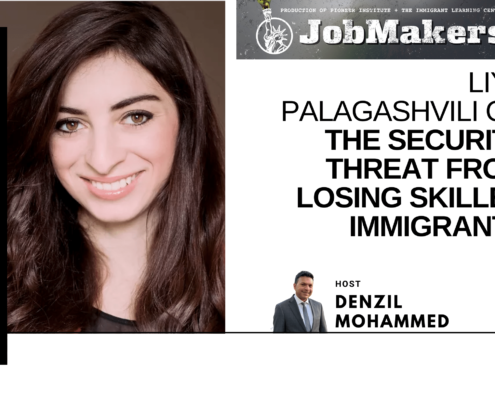
Liya Palagashvili on the Security Threat from Losing Skilled Immigrants
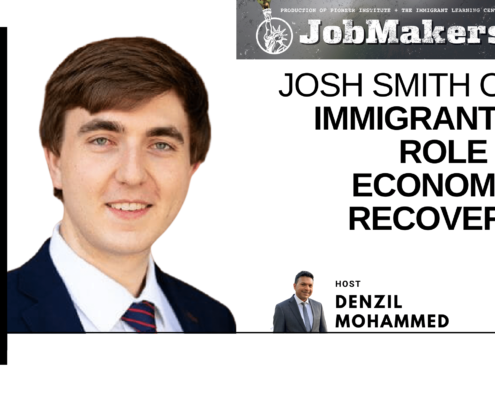
Josh Smith on Immigrants’ Role in Economic Recovery
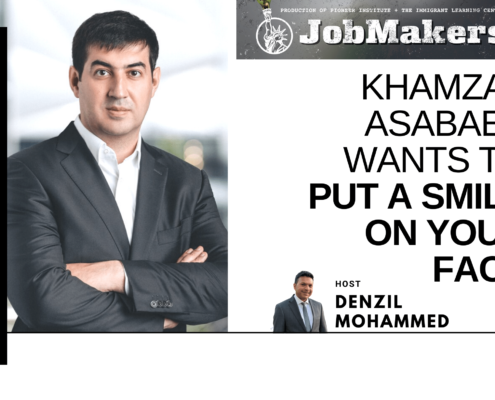
Khamzat Asabaev Wants to Put a Smile on Your Face
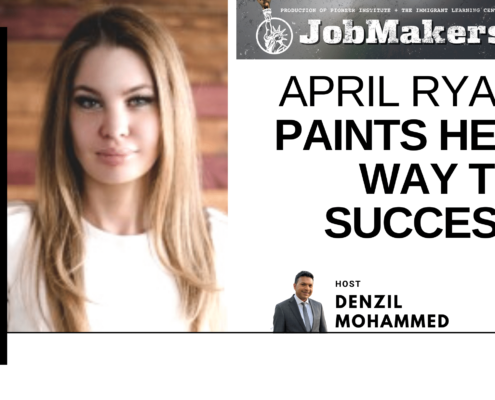
April Ryan Paints Her Way to Success
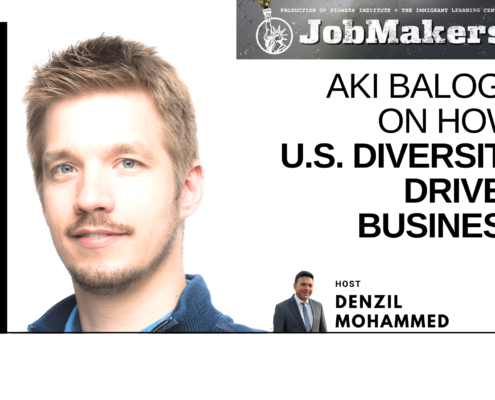
Aki Balogh on How U.S. Diversity Drives Business
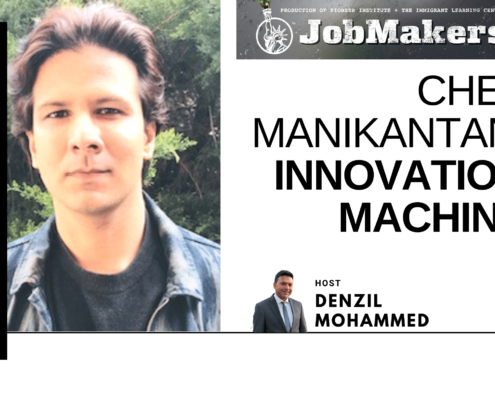
Chet Manikantan: Innovation Machine
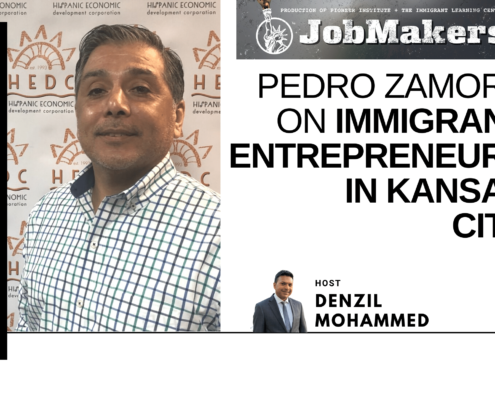
Pedro Zamora on Immigrant Entrepreneurs in Kansas City
